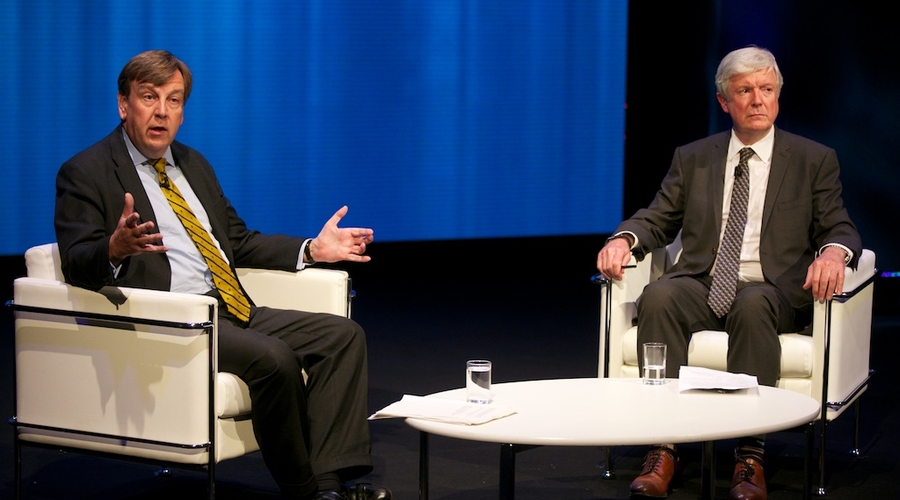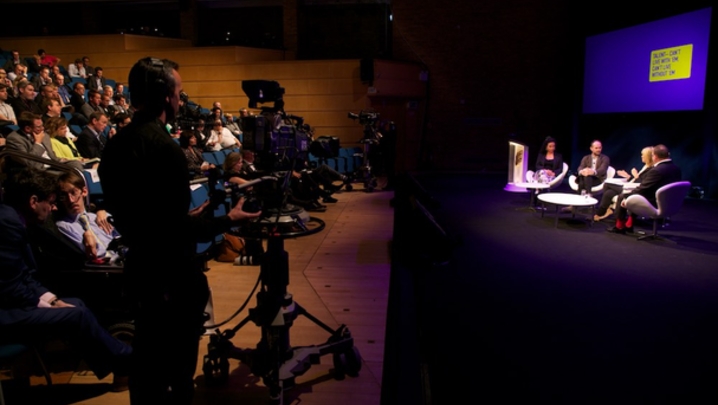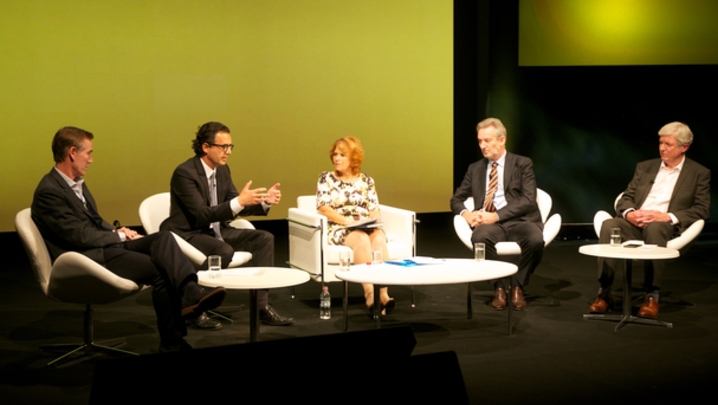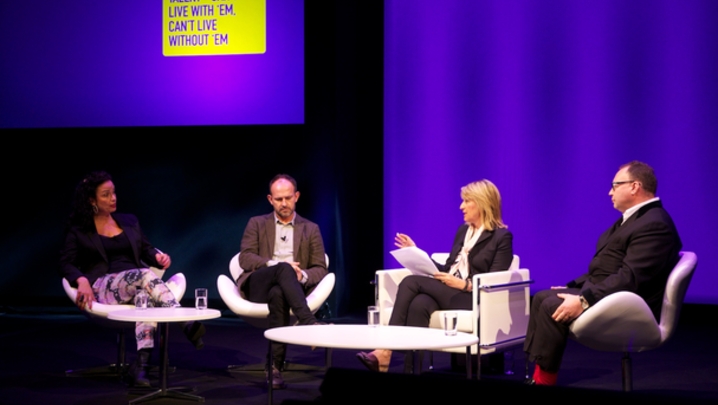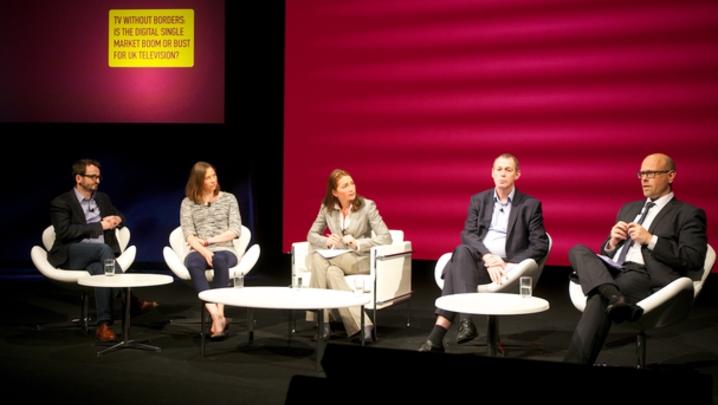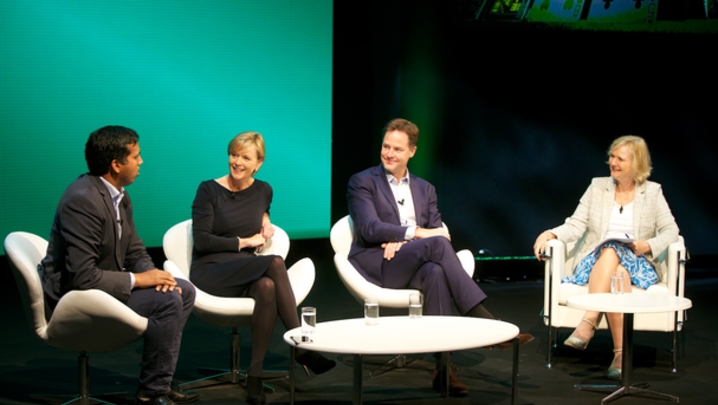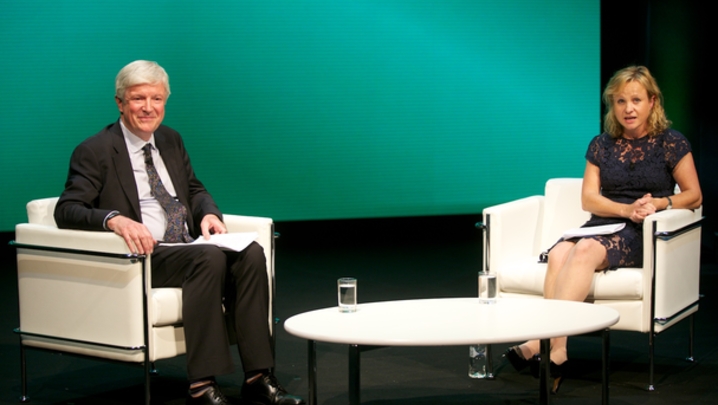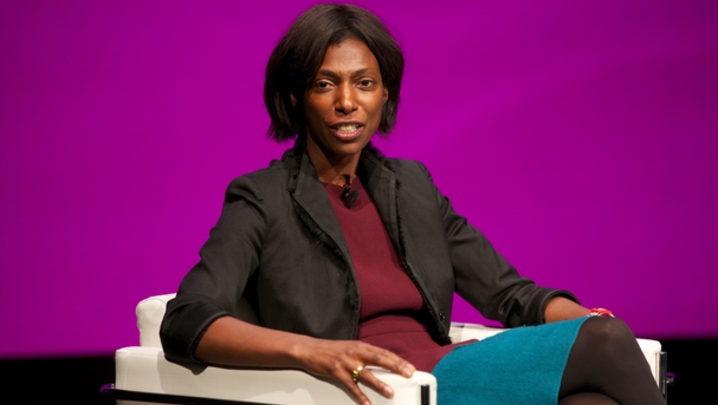John Whittingdale, Secretary of State for Culture, Media and Sport, is welcomed to day one of RTS Cambridge by BBC Director General Tony Hall. Watch his full speech, plus questions from journalist Steve Hewlett, Channel 4 boss David Abraham and Pact chief John McVay.
Still picture by Paul Hampartsoumian.
FULL SPEECH
Introduction
Thank you very much indeed. It is a pleasure to be with you to deliver this keynote address.
I know that sometimes in the past this event has been a baptism of fire for an incoming Secretary Of State – and I am keenly aware that I have only been in post for just over four months. However, I have spoken at the RTS a number of times in the past.
Many of you I got to know in the ten years that I chaired the Select Committee – and some may even have had the dubious pleasure of having appeared before me. But in fact my first appearance at Cambridge was twelve years ago when I was Shadow Secretary of State.
In his report about that Convention, Torin Douglas wrote:
Leading broadcasting executives are descending on Cambridge for the Royal Television Society Convention. Among the items on the agenda will be whether the BBC has become too powerful and should be more tightly regulated…. There are plenty of important issues to argue about, such as what services the BBC should provide, how big it should be, the level of the licence fee, and whether it should continue to be regulated by its board of governors, or come under the new communications regulator, Ofcom.
He went on:
Meanwhile the Conservatives’ culture spokesman John Whittingdale has set up his own panel to review the future funding of the BBC.
I suspect at the RTS Convention in a decade’s time the same debate will be taking place once again – although I rather doubt that I shall still be a part of it.
However, it is right that that debate should take place because television is of huge importance to the nation – and the BBC lies at the heart of British television.
I have always loved TV. It is often said that politicians do not have the time – nor the desire – to watch TV. Or that if they do then they only watch Newsnight, House of Cards, Borgen and The Thick of it.
I watch all of them. But I grew up loving programmes like Batman, Dr Who and Thunderbirds – and admit that I still watch all of those in their modern incarnations today. And my PVR is full of shows like Strike Back, Humans, Partners in Crime and X Factor.
So television matters to me – and I am acutely conscious that it is something that this country is extraordinarily good at.
The success of our tax credits is now attracting films like Mission Impossible 5 and Star Wars, and high-end TV shows like Game of Thrones, the last series of 24, and the latest medieval drama - the Bastard Executioner, to be made in the UK.
The worldwide popularity of such dramas also helps to attract millions of visitors to these shores.
Great creativity and content will always find a demand. However, I am very conscious that the industry is going through a time of extraordinary change. For the viewer there is a proliferation of choice on a scale not witnessed before.
Not only can television programmes now be viewed whenever one chooses to watch them and on a range of different devices, the choice available goes on growing as the traditional public service broadcasters continue to invest in high quality programmes. While more recent entrants like Sky and now Amazon and Netflix are also commissioning more and more original content.
The creative industries employed around 1.8 million people last year including those in the TV, film, video and radio sectors and those in IT services - including video games. And the TV industry estimates that it alone generated £13.3 billion in revenue in 2014, an increase of 3.1 per cent year on year.
It is against this backdrop that we approach Charter Review and - given the huge change that has taken place in the last ten years - it is surely sensible that we should take this opportunity to consider the BBC’s role in this changing environment - to look at its funding, its governance, its mission and purpose, its scale and scope.
That is why the Select Committee at the end of the last Parliament spent over a year examining the Future of the BBC and produced a report running to some 166 pages.
That report was widely welcomed as setting the agenda for the debate on Charter Review. The questions it posed were very similar to those posed in the Green Paper. Questions that Steve Hewlett recently described as “entirely predictable and perfectly proper questions about the BBC’s purposes, scope and funding”.
I was therefore somewhat surprised that the Green Paper was greeted as somehow heralding the demise of the BBC or as evidence of a Murdoch-inspired agenda to dismantle it – a charge that I found particularly surprising since my last meeting with Rupert Murdoch took place over four years ago after I had served a warrant on him requiring his appearance in Parliament in relation to the phone-hacking inquiry.
So there is precisely no prospect of the BBC being abolished. I therefore found it rather odd of the BBC to ask people if they could live without it. My surprise was that nine of the 70 households said they would prefer to pay nothing and not receive the BBC! Had I been asked if I could live without the BBC I would certainly have said No.
I cannot imagine anyone else but the BBC commissioning the distinctive and brilliant QI, which has now been sold around the world. And it is hard to believe that a commercial broadcaster would have stuck with Blackadder and The Office - neither of which were overnight successes but which both belong in the comedy hall of fame.
Of course I understand that some saw the publication of the Green Paper so soon after the Budget as all part of a wider plot. And I realise that the difficult decision that we had to take to ask the BBC to meet the cost of free TV licences for those aged 75 and over will mean hard choices will have to be taken.
I regret that it was necessary. However, it is not unreasonable that the BBC – which receives £3.7 billion from the licence fee – should, like every other publicly funded body, be asked to make its contribution towards the overriding objective of getting the country’s finances back into balance. In doing so, we reached an agreement, which the Director General called the right deal for the BBC in difficult economic circumstances. And in the coming weeks I will be asking the institutions which my department funds to make their contribution too.
However, the Charter Review debate is an entirely separate exercise and raises more fundamental questions.
Let me be clear: there is no threat to the BBC’s status as a world-class broadcaster, let alone an existential threat. What we are exploring – as every Charter Review must explore – is how the BBC fits into the contemporary broadcasting landscape and how it might become even better.
It is not my job to run the BBC. I cannot dictate what channels exist, which individual programmes are shown, nor how many people are employed. It would be wholly wrong for me or any politician to do so. However, it is right to ask questions such as whether the BBC is sufficiently focused on providing distinctive programmes and services.
To give one example, its highest spending service, BBC1, regularly scores lowest on the BBC’s metrics for “fresh and new” content and has been identified in consecutive BBC Trust reports as needing to make its offering more distinct. That is not a value judgement on my part; it is something the BBC Trust has reflected.
It is also important to look at the impact that the BBC has on its commercial rivals and - again to give just one example - whether it is sensible for its main evening news bulletin to go out at the same time as ITV’s.
So I confirm that my department is commissioning independent research into some of the BBC’s impacts on the market and on its commercial competitors. This report will feed into the evidence base for Charter Review.
No-one could deny that the BBC has made some bad mistakes in the last few years. Savile, McAlpine, Ross-Brand, severance payments and excessive salaries have all contributed to a widespread view that the governance structure needs reform.
So as part of the Charter Review process, I am pleased to announce that I am setting up an independent review into the governance and regulation of the BBC.
It will be conducted by Sir David Clementi, whose experience – including being Deputy Governor of the Bank of England and reviewing the regulation of legal services in England and Wales - makes him uniquely placed to undertake this review.
The review will take into account responses to the Green Paper and will report early next year. As I’ve said from the beginning, I want to engage the public in a debate, so I am delighted that we have had 28,000 responses already and that the BBC Trust has received around 40,000 to their own online consultation.
Because the licence fee is a major intervention in the broadcasting market, Charter Review will quite properly consider BBC funding too.
Public support for the licence fee is not unqualified. The BBC’s own annual report shows that it no longer enjoys majority support among the public. And of course the BBC benefits from subscription and advertising in foreign markets.
Interestingly, Armando Iannucci, who gave this year’s MacTaggart Lecture at Edinburgh, has advocated an overseas subscription model for the BBC, which in time could replace the licence fee. I am looking forward to discussing his ideas with him soon.
But it is also very important that objective research about public preferences and willingness to pay forms part of the Charter Review.
The Green Paper outlines three overarching options for future funding models: a modernised licence fee, an alternative household levy, and elements of subscription. All deserve careful consideration.
Future of the BBC
I hope that we can now have a serious debate about the future of BBC. I look forward to the BBC’s own contribution to that debate and very much welcome a number of the proposals in their document published last week.
It is undoubtedly good news that the BBC plans to invest more in original British drama and comedy. I also strongly welcome the greater emphasis on the need for more distinctive programming.
I am delighted that the BBC plans to invest in local news, covering important components of local democracy such as councils, courts and public services.
By commissioning such content from local media outlets, and by making it freely available to all, the BBC can support local newspapers and enhance local accountability and democracy.
It is an excellent idea – not least because it was proposed by the Select Committee last year. However, it is important that it should help local media rather than further undermine them and I would therefore hope that the BBC would not seek to recruit or employ these journalists directly.
Instead they should look to commission content from qualifying local media organisations and news agencies perhaps on the basis of tender.
The development of an open platform to host the best content from museums, galleries and other cultural and scientific institutions also appears to be very much in line with a public service ethos and could provide support to them at a time when they too are under financial pressure.
At a time of greater global instability and a rising volume of propaganda from countries with little regard for objectivity and truth, the role of the BBC World Service is even more important. Having spent five years as Chairman of Parliament’s Ukraine Group, I am very much aware of the need for an impartial and honest source of news in contrast to that which comes from Russia.
I therefore welcome the BBC proposals to invest in better news services in those parts of the world where there is the greatest need for an accurate, reliable and impartial source of news.
And, of course, I look forward to the proposals being announced by Lord Hall tomorrow around BBC Worldwide and BBC Studios. These are central to the way the BBC operates as part of a wider media environment and will form an important part of the Charter Review discussions over the coming months.
PSB and terms of trade
Consideration of the wider media environment and the BBC’s impact on it matters. One important aspect of that wider environment is the independent television production sector, which has been such a strong UK success story over the last decade.
During that time, revenue has grown to £3 billion a year.
And the export market for finished programmes, international commissions and format sales has trebled in size to £1.2 billion.
The regulatory framework put in place to support independent producers has played a part in fostering a vibrant and creative sector. The terms of trade, for example, have helped small independent producers to grow by maximising value from intellectual property rights.
It is perhaps worth reminding ourselves what the original objectives of the regulations were back in 2003:
to promote cultural diversity and to open up the production system to new energies and voices;
to stimulate the growth of small and medium sized enterprises, promoting creativity and fostering new talent; and
to tackle vertical integration within the UK programme supply market.
I think those objectives still hold good. But it is also sensible to consider whether the regulations we currently have in place are still the most appropriate for UK businesses and the viewing public.
There is no doubt that the supply market has changed fundamentally since 2003. Mergers and acquisitions have changed the landscape. For example, seven of the twelve biggest UK independent production companies are now integrated with major international broadcasting companies.
In its recent public service broadcasting review, Ofcom noted concerns that have been expressed about the changing landscape as a result of consolidation and overseas acquisitions. They went on to suggest that this was an area that should be kept under review.
As a result the time seems right to check whether the regulations remain the most effective means of supporting small independent producers in their negotiations with broadcasters, in light of significant - and probably continuing - changes in the relative size and strength of the different parties.
That is why I have asked them to undertake a health-check of the terms of trade regulations.
I remain open-minded about whether any change is needed. I encourage all interested parties to feed into Ofcom’s review, so that when we come to decide on whether there should be any change, we will be drawing on the firmest and most comprehensive possible evidence about the likely market impact of any changes.
Another hotly debated set of questions exists around media regulations, including the “Balance of Payments”, which my department has consulted upon recently. This is an issue which covers copyright remuneration for retransmission of channels on cable platforms and, more widely, whether the payments between PSBs and platforms are in balance.
The consultation sought views on whether and how we could allow more freedom in the negotiations between stakeholders to ensure that the best possible content is made available to the consumer.
In the main, respondents thought that established system has been working well - although many respondents argued that the policy rationale behind exempting cable platforms from having to pay copyright fees for the content they are carrying is no longer relevant.
Associated with this is the issue of PSB prominence on electronic programme guides. The debate centres around whether an update of the existing regulations is necessary because of converging technology.
These are complex issues and we have more work to do to understand the consequences of possible changes, but I can confirm that we will be publishing the Government’s response before the end of the year.
Digital Single Market – AVMSD - Portability plus
The UK also has a leading role to play in the European broadcasting market. It is in all our interests that it remains vibrant and competitive.
We have enjoyed a stable regulatory framework that has allowed the audio-visual sector to become such a success story for Europe and the UK. Maintaining the country of origin principle is the cornerstone that has allowed the market to flourish, but the framework must also keep up with technological and market developments.
The Government supports the overall ambition of the Digital Single Market - it offers huge potential for increasing jobs and economic growth, as well as safeguarding Europe’s future competitiveness.
It provides an opportunity to make EU rules work better in an increasingly digital world, which is important for the success of the audio-visual sector and the creative industries as a whole. We want to ensure our industries are able to reap the benefits that the digital single market brings.
Portability is a key part of the Commission’s proposals for Copyright reform and the Government strongly supports the calls for much greater progress.
Consumers understandably want to enjoy continued access to their favourite programmes when they travel abroad. And it is only right for someone who has paid for access to a subscription service - or even just the licence fee - to be able to access that content when on holiday overseas.
However, we also need to ensure that we do not harm investment in UK content production and export growth – at which the UK excels.
We must be careful not to create loopholes that could be exploited. My colleagues in the Business department and I are therefore looking to the industry to deliver portability, so that we can avoid the threat of overly zealous regulation in Brussels.
So I urge broadcasters to make their content more widely available and to come forward with their own proposals for portability and how this can be made to work for your industry.
The issue of cross-border access for those based abroad is trickier, and I am very conscious that this is a particular concern for the audio-visual sector. We are pressing for more detail about the Commission’s proposals, which will need to be evidence-based and respect the rights of businesses to tailor products to their markets. I am also determined that we do everything we can to make sure that strong incentives for investment are not undermined.
Striking the right balance is key - we need to make sure that investment remains attractive and creators are fairly paid. However, the current difficulty that those living abroad have in accessing UK channels and content is also a driver for piracy.
I was recently alarmed when talking to an ex-pat Brit living in Spain to hear how he was able to access every UK TV channel - free to air and subscription alike - as well as hundreds of movies and catch-up TV for around 25 euros a month. A quick search on the internet reveals a number of services making similar claims.
These services take money away from the people who invest in content, such as many of you in this room.
It is thanks to effective enforcement partnerships between industry, government and law enforcement agencies that these services are not operating in the UK.
We need to continue to take action against copyright infringement both at home and abroad. But we also need to make sure that people like that ex-pat, who love our TV and want to pay to watch it, have the opportunity to do so legally.
This means making sure that changes to copyright law must be supported by a strong enforcement regime. I am very pleased that the Commission is going to look at enforcement as part of its proposals and particularly at commercial-scale infringement.
The UK is a world-leader on copyright enforcement and the Government has taken a number of steps to strengthen its position - including funding for the Police Intellectual Property Crime Unit and helping rights-holders to have copyright infringing websites blocked by court order.
We should build on our own experience of what works to help improve copyright enforcement in Europe and around the world.
And of course the more that industry can do to innovate and find new and easier ways for consumers to access content legally, the less attractive piracy will become.
Conclusion
Finally, I want to say something very simple.
The UK television industry is celebrated and loved across the world. It provides a huge number of jobs and generates massive economic activity. It informs and entertains.
The years ahead promise to be tremendously exciting for the industry.
I see it as a huge privilege to be the Government’s television champion at this time.

